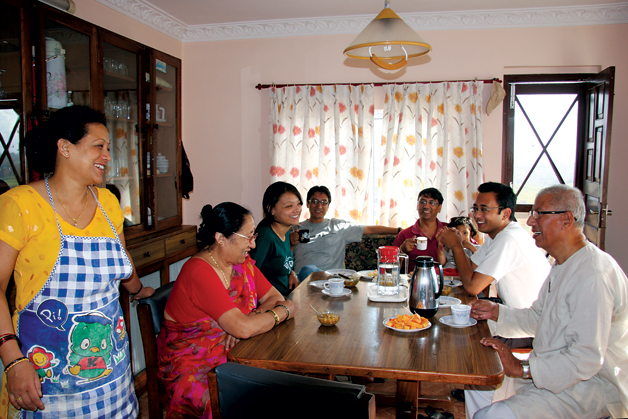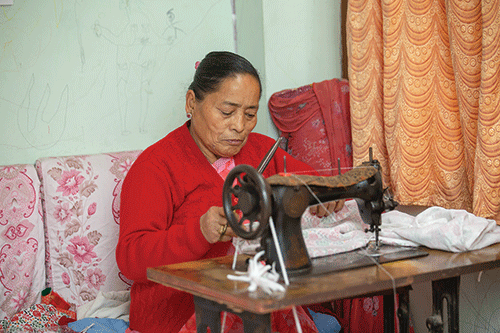
She laughed her wild laughter. It was very affecting to all present. We all just had to share in. She told us then of a dream where she was chased by a pig made of nylon rope, the colorful type that we buy at hardware stores to tie up things and hang our laundry on. A pig is considered an impure animal by most Nepalese and so in my mother’s dream, where she somehow was a devout Hindu, she ran as fast as her legs could take her. “And your legs didn’t hurt?” asked my aunt, her own laughter as infectious as my mother’s. She was doing the dishes, eyes sparkling with simple joy, when she mentioned the knee pains my mother suffers in real life. To which my mother answered, “not at all, I ran so fast, which is amazing because in most of my dreams, I cannot run at all and when I wake up, I know why. It’s because I have fallen asleep with my legs folded!”
Around the dining table at the end of the day and sometimes for hours after dinner or breakfast, my extended family, like thousands of others all over the city, gathers to share experiences, stories and gossip. Around that table we have discussions about everything from life, religion, marriage, homosexuality (owed to my sister which suddenly makes everyone want to leave the table or at least change the topic), careers, people we don’t like, and so on. Some of these opinions come from people who have grown up very differently than I have, who believe in a different set of values and have a 180 degree different perspective on things than I do. It is quite a challenge to understand these strong opinions from people whom you love, but who think so differently from you. And even though a consensus is often reached, it comes only after loud, sometimes heated discussions. Listening to and taking part in such conversations, understanding opinions and where they stem from can allow nothing but a broader point of view not just about a family but about how entire earlier generations were raised, what they experienced and how they perceive issues in today’s context.
Growing up in an extended family with grandparents, parents, uncles and aunts, cousin-brothers and sisters, and your own siblings, plus the occasionally visiting married aunts with their sons and daughters, has its pros and cons (to put it modestly). Privacy goes right out of the window most times, but the lack of privacy can be a blessing in disguise. Who needs isolation when you get a greater sense of peace and calm from the cacophony that is a Newar joint family? My surprise plans were or are often foiled by my over-excited siblings; I am woken up when I want to sleep in late because my little sister can’t reach the toothpaste in the bathroom cabinet and wants me to get it for her; I can’t fall asleep even when I’m dead tired because my uncle is addicted to late night radio shows which he has to hear at a certain volume; when I sit down to enjoy a film on TV, my mother, aunt and grandparents swarm the living room, snatching away the remote to switch to their afternoon soaps; my bank balance is a common family account used for ‘emergencies’; the list goes on and on and on. But there are moments, funny moments, that only seem funny after they’re over. These are owed to young, inquisitive, growing children in the house which make up for the above ‘problems’.
One time, my younger brother (who’s nine) decided he was going to find out what condoms meant. He had seen a Hindi film actor with a t-shirt that read ‘Use a Condom’ and he just had to know. This is when he informed us at the breakfast table that he had asked half the family and told us some of their answers, none of which convinced his inquisitive mind, but all of which made me want to laugh out aloud. My sister had told him quite accurately, actually, that condoms were a method that helped to not make a baby; another cousin told him condoms were medicine; and his mom told him that it was not time for him to know. And then it was my turn. I tried to flee the scene at once, but he managed to ask me, at which point I told him to stop this nonsense and made him finally shut up. My father, who had covered his face with a newspaper either to laugh or because he wanted to escape my brother’s question, finally put down his paper and almost audibly said thank you to me, or so I like to think because it makes it funnier. And, in my opinion, it’s all about ‘the funny’ if you want to survive the drama of an extended Newar family with people ranging from five to 76 years old living under the same roof.
This sense of humor is how I deal with life in general. Life gets hard crack a joke, take a breather and take another shot at it. You get asked a question you don’t have an answer to by a girlfriend make light and get out of it. A friend is feeling low and needs some cheering up bring on the crassest jokes ever. You want to clear the awkward silence at work between new colleagues – ease in a funny incident. Everyone can use a joke. It’s all you need to sometimes change how you and others feel.
When I joke with friends, I sometimes find my friends making comments about me that I then make at home to my mother when she goes off on another one of her stories, standing up in front of the family, eyes dancing, hands in the air, with my younger sister nearby, hysterical, with water in her mouth that she’s just tried to drink and now can’t seem to, because she’s laughing so hard. When I get mad and throw my tantrums, I cool down overnight, exactly like my father does. I laugh hard and I’d like to think my laughter is as infectious as my aunt’s. Sometimes when I hear a joke, I manage to have water in my mouth, just like my sister manages every night when there are jokes at the table. I love to share jokes about friends and my school life in a hostel exaggerating enormously, inserting sub-plots and adding character traits to people in my stories who would otherwise have been quite unremarkable and hence would have spoiled my story just like my uncle does.
Which brings me to the question that I found myself with, as the pandemonium finally seemed to wind down for the day: what, or rather who would I have been without the family that I have? The answer eluded me as I thought about how I would be different if I had grown up in a smaller family or around different people. Would I still have the compulsive habit of reading something, anything, before going to bed? (Dad) Would I have wanted to grow up in a hostel? (Uncle) Would I love watching television so much? (Grandfather) Would I be the kind of guy who loves to show off sometimes, but not to hurt anyone, just to feel good? (Grandmother) Would I still design houses to help myself sleep when I couldn’t? (Dad) Would I still love to hold audience with a joke? (Sister) Would my idea of great food be the same? (Mom) Would I be the kind of guy who would be just as happy with less? (Grandfather) Would I still sleep through an earthquake? (Aunt) The answer is that my personality seems to have become a complex product of the traits of all my family members combined. For better or for worse, I am like no one else in my family, but there’s something of everyone in me. So it would only make sense that whatever success comes my way, it too like my privacy at home will be distributed evenly towards my family members, including my visiting aunts. !
I believe a majority of Nepalese families echo these sentiments about living together and quite enjoy the lifestyle. Besides the lighter side of living in a joint family, there are serious advantages that stem from it, too. When people from different generations understand each other better out of something as basic as simple exchanges at home a harmony is inevitable in the community. For such an economically and politically fragile country like ours, where unique traits of a rich society such as race, caste and language can be turned into politically dividing issues overnight and used against one another for selfish gain, joint families and the sense of unity they promote make some much needed sense.
Utsav Shakya is a freelance writer and can be reached at utsavshakya@gmail.com.
Phone: 9841327187








